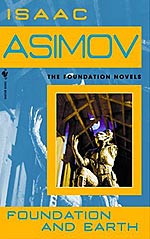
![]() verkisto
verkisto
7/26/2016
![]()
With Foundation and Earth, I've made it through the core volumes of Asimov's Foundation series. There are two prequels (along with three books that expound on the future of the series by three other authors) that I will likely go ahead and read, but as far as what Asimov envisioned for the series, I've finished it. And it's been a mixed bag of good and bad, as I've mentioned already.
The women characters are still treated like they're subservient, even as Asimov strives to make them strong characters. Women of political importance are still inexplicably drawn to Trevize, and throw themselves at him with some sort of abandon. There was one part of the story where Trevize cons their way through a planetary checkin station by telling the person in charge that Bliss was a prostitute they took along to keep from getting bored, and certainly the guy wouldn't want to break the "Man Code" and get Pelorat in trouble with his wife by reporting it, would he? It was pretty tasteless, and out of sorts with the rest of the story. Plus, as previously mentioned, why are these kinds of things still acceptable some 20,000 years in the future? Wouldn't it be nice to think that we had grown out of that stuff by them?
The biggest problem with the book is the cast of characters. Bliss and Pelorat were okay characters, but weren't as lifelike as I would have liked, and Trevize was boorish and arrogant. He would consistently tell everyone that he was improving his behavior, but then a few pages later he would be back to his old habits. It was hard to really care about any of them, which was a shame, because I got really caught up in the story of the three of them searching for Earth.
I had noticed in the previous volumes that the books are dialogue-heavy, but if I hadn't noticed it with those books, I would have realized it by now. A good 90% of the book is dialogue, which is interesting since Asimov does a great deal of world-building in the novel. Taking Trevize and company from one planet to another in search of Earth meant that Asimov took them to five planets before finally making it to the Solar System, and much of what we learned about those worlds we learned from the characters talking to each other. It's not a bad thing by any means (the story was compelling, moreso than the previous books), but it was a surprise to me.
So I found the book to be more readable and compelling than the previous four books, but I still found some of the thematic elements to be unsatisfactory. Each book toys with the idea of free will being an illusion as people are manipulated by forces outside their control (first Seldon, then the Mule, then the Second Foundation, then Gaia, and then some robot living on the Moon), and it would have been okay if it were just one of these things, but each wound up being the pawn for whatever force came next. It got a bit ridiculous, but not so much that I'm ready to give up on the rest of the books.
Finally, I think I was expecting more out of the ending. Asimov took us around the galaxy for 450 pages, and then once Trevize and co. found Earth, he took about twelve pages to wrap up everything with a quick summation, even tying this universe in with the one that populated the Robot series. This is fine, but I get the feeling that this was an OMFG moment for folks who had read the books. Me? When Daneel Olivaw showed himself, I got the feeling he was someone I should have known, but didn't. It was kind of like being the only person in a group who didn't get a joke.
The ideas behind the novels are the real stars of the series, but it's hard to recommend the books based off of the ideas alone. If I had to recommend anything, it would be to read summaries of the books on Wikipedia or elsewhere and see if you think the ideas are worth reading all the books for more detail. Personally, I'm not sure that the ideas necessarily outweigh the effort of having to trudge through most of them.